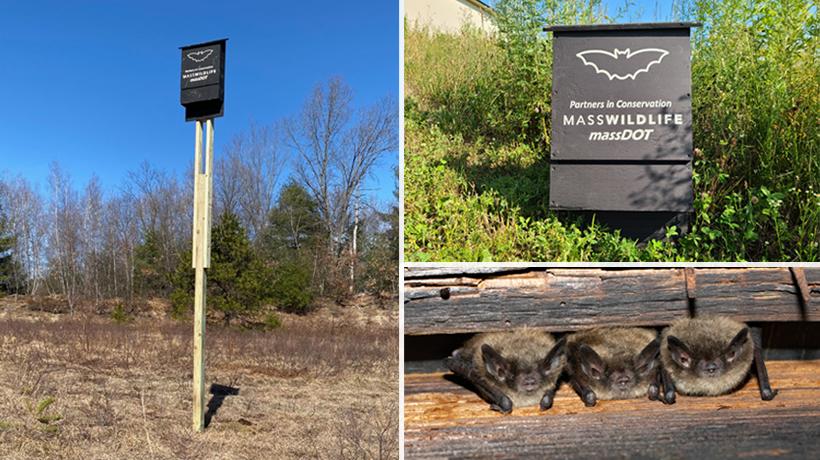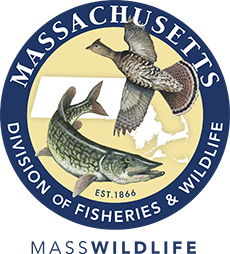- Division of Fisheries and Wildlife
- MassWildlife's Natural Heritage & Endangered Species Program
Media Contact
Media Contact, MassWildlife

There are nine species of bats found in Massachusetts, five of those are listed as endangered. One of the greatest threats to bats is white-nose syndrome, a fungal disease that impacts bats that spend their winters hibernating in caves and mines. Artificial bat houses provide clean homes for bats that are free of white-nose syndrome.
MassWildlife has been working with partners and volunteers to construct, install, and monitor bat houses on Wildlife Management Areas and other locations across Massachusetts since 2020. This effort provides a safe roosting place for bats and raises awareness about the important role bats play in our environment. Properly constructed and strategically placed bat houses can be an important tool in assisting bat survival.
With support from MassDOT, scout troops, and individual volunteers, the bat house project is showing promising results. Some of the houses have been occupied by bats, and people are learning more about bat conservation. You can help the program continue to grow and support our native bats!
How to help:
- Build a bat house: One of the best ways you can support bat conservation is to put up an artificial roost, like a bat house. Bat houses give females a safe, warm place to raise their young. Since most female bats only have one pup each year, bat populations grow very slowly. Additionally, due to habitat loss and degradation, it is becoming harder for bats to locate natural roost sites to raise their young. Installing a bat house on your property can provide a safe environment for bats, while protecting your yard from pest insects, like mosquitoes, moths, and beetles. Bat houses can be purchased, or you can build your own. You can find a guide to bat houses on MassWildlife’s website, including plans for building a bat house, installation tips, and advice for attracting bats to your bat house.
- Become a volunteer bat monitor: Update: All volunteer positions have been filled for 2024
- Report bat colonies: If you observe a group of bats (10 or more) this summer, report it to MassWildlife using this form.
- Create habitat for bats: Bats seek shelter under peeling bark on dead trees. If you have dead or dying trees on your property, leave them standing as potential roost sites for bats. You can also create a bat-friendly landscape in your backyard by adding night-scented flowers and water features such as a pond.
- Reduce pesticide use: Pesticides make it difficult for bats to find healthy food to eat. Insecticides can cause bats to go hungry from the lack of insects available.
For more information on white-nose syndrome and other threats to bats, see MassWildlife’s webpage on bat mortality in Massachusetts.

